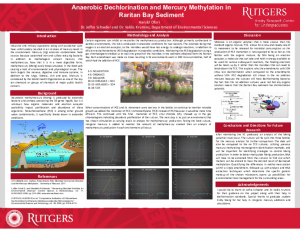Ofori, Harold: Anaerobic Dechlorination and Mercury Methylation in Raritan Bay Sediment
Title: Anaerobic Dechlorination and Mercury Methylation in Raritan Bay Sediment
Name: Harold Ofori
Major: Biology and Africana Studies
School affiliation: School of Environmental and Biological Sciences
Programs: Aresty – RA Program
Other contributors: Jeffra Schaefer, Valdis Krumins
Abstract: Molasses is an organic polymer that is more viscous than the standard organic mixture. This allows for a slow and steady rate of its monomers to be released for microbial consumption, so the production of PCE monomers is not expected to be as fast as the bottles with the organic mixture. By SO4 being an electron acceptor, a molecule that can take and hold in energy available to be used for various subsequent reactions, the floating electrons will be taken up by it rather than the microbes that can need to break down the TCE. This explains why the amendments with SO4 show less dechlorination when compared to the amendments without SO4. PCE degradation still shows in the no addition mixtures because the cultures still have dechlorinating bacteria; the fact that the no addition cultures were not fed any organic solution means that the Raritan Bay sediment has dichlorination potential.
